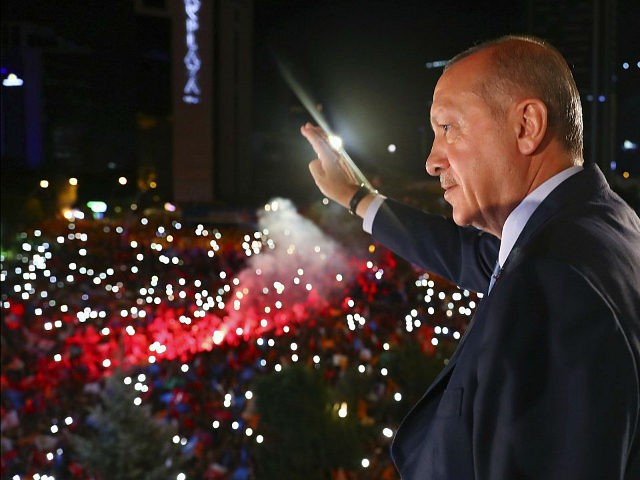Turkey and its freshly re-elected President Recep Tayyip Erdogan are not the most popular names at the headquarters of the North Atlantic Treaty Organization these days, but Turkey is reportedly seeking an expanded role in NATO nonetheless, according to a report surfacing Friday.
Hurriyet Daily News cites the plan for Turkey to take charge of NATO’s Very High Readiness Joint Task Force (VJTF) in a few years:
The formation of such a force was decided at the NATO Wales Summit 2014 as a “Spearhead Force” to the NATO Response Force (NRF) for the intervention of a possible crisis within a week. Seven NATO members contribute to it in six groups: The German-Dutch forces, the United Kingdom, France, Italy, Spain, Poland, and Turkey. It is a force of around 5,000 formed in five battalions supported by air forces, navies, and special forces of member countries.
According to NATO documents, the idea was to “better respond to the changing security environment to the east and south of the Alliance’s borders.” Turkey, the most southeastern member of the alliance, neighbor both Russia and Middle Eastern countries like Iran, Iraq, and Syria. One of the three tactical command headquarters, the Land Command, is in İzmir, Turkey; the two others being the Maritime Command in Northwood, U.K. and the Air Command in Ramstein, Germany.
The “changing security environment” was the Russian intervention to Ukraine and the annexation of Crimea. NATO had adopted a light attack forces command structure following the Sept. 11, 2001 terrorist attacks by al-Qaeda. The Ukraine case and the concerns of the Baltic states from growing pressure from Russia has forced NATO to adopt a new defense policy.
When Turkey’s role in the VJTP was announced, NATO officials also presented it as a vote of confidence in Turkish membership and a reward for a job well done in resisting the Soviet Union during the Cold War. Moscow’s current designs on the Black Sea keep Turkey in a pivotal strategic position.
A certain expectation that Turkey would live up to the honor was very tactfully expressed, such as NATO Secretary-General Jens Stoltenberg hoping for “Turkey’s continued transparency” in its invasion of Syria to push Kurds back from the border.
“Turkey has a special role as a neighbor also knowing the region and already Turkey has worked closely with the government in Baghdad and also with the Kurdish regional government,” Stoltenberg said in April.
A Turkish official told Hurriyet the Erdogan government happily “abides by all NATO decisions taken,” but added Ankara is a wee bit less enthusiastic about containing the Russians than it was during the Cold War, saying, “We have two reservations, such as the binding clauses of the Montreaux agreement and to not attempt any action to agitate Russia, which we have not seen any violation of so far from our allies.”
As it happens, the rest of NATO has a few “reservations” about Turkey, too. The United States is on the verge of imposing sanctions against Turkey for purchasing Russia’s S-400 missile defense system, possibly including cancellation of Turkey’s order for advanced F-35 joint strike fighters.
There are deep concerns about what Turkey might do with those F-35s, and who it might share the technology with, as well as diplomatic concerns about giving state-of-the-art weapons to Erdogan’s increasingly aggressive, authoritarian, and Islamist regime. Stealthy aircraft are potentially dangerous instruments in the hands of a regime known for cross-border military operations and covertly supporting unpleasant groups.
On a practical level, Turkey’s mishmash of Russian and Western equipment might be difficult to integrate with NATO systems, especially for a “very high readiness” rapid-deployment strike force.
“Turkey is a member of NATO on paper only, and now cooperates with countries that are against the U.S., not only in words. This delivery is something that Israel cannot understand,” an Israeli official said of the F-35 delivery on Friday. Israel currently has a dozen F-35s in its inventory; Turkey has ordered 116 of them.
There have been calls to drum Turkey out of NATO altogether, although as Stoltenberg’s remarks made clear, the alliance sees considerable strategic value in retaining Turkey as a member, and believes it can exert a positive influence on Turkish politics through continued engagement. Some critics point to Erdogan’s fishy re-election and near-dictatorial powers and wonder how much of Turkish politics remains to be influenced.
These conflicting positions are neatly summarized in the work of National Security Advisor John Bolton, who has expressed skepticism about Turkish membership in NATO and worried that Erdogan is “moving away from the West,” but also warned that severing Turkey from the alliance would serve Russia’s strategic interests.

COMMENTS
Please let us know if you're having issues with commenting.